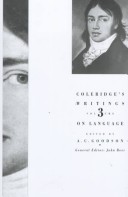Coleridge's Writings
3 total works
Vol 1
Princeton University Press has long been the publisher of the Collected Works of Samuel Taylor Coleridge (Bollingen Series LXXV) and the Notebooks of Samuel Taylor Coleridge (Bollingen Series L). These series, under the editorship of Kathleen Coburn, have made clear the extraordinary sweep and power of Coleridge's mind. Wide ranging in his intellectual interests, he often passed quickly from one subject to another, so that the scope and mass of the material he left can be bewildering to readers. This new series, Coleridge's Writings, addresses those who wish to have a guide to his important statements on particular subjects. Each volume of these extracts will present Coleridge's writings in a major field, tracing the growth of his ideas and making connections with relevant writings in the period. This volume in the series contains material for the study of Coleridge's political and social theory. His best-known works on these topics, the second "Lay Sermon" of 1817 and On the Constitution of the Church and State, are printed with slight abridgments; the collection also includes sets of briefer extracts illustrating the major steps in the development of Coleridge's mature thought. The editor has provided notes, commentaries linking the texts, and a bibliography of secondary study of Coleridge's social and political ideas.

